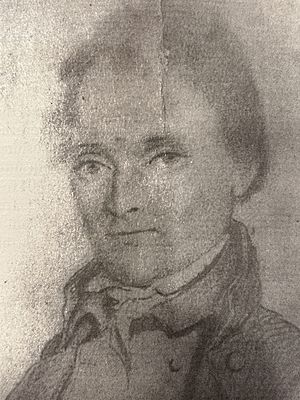West Ford facts for kids
West Ford (c. 1784 – 1863) was the caretaker and manager of Mount Vernon, which had been the home of George Washington. Ford also founded Gum Springs, Virginia near Mount Vernon. He was a man of mixed-race, and possibly of Washington descent.
Ford was born on the Bushfield Plantation in Westmoreland County, Virginia, the son of a woman named Venus, who was classified as "mulatto" in the parlance of the time. Venus was held in bondage as a house slave by Washington's brother John Augustine Washington, and by John's wife Hannah. The Ford family's oral lore states that West Ford’s father was President Washington, and most historians who have addressed the matter believe that theory is possible but not probable.
In 1802, Ford moved to Mount Vernon, where President Washington had died in 1799. Ford became a free man about 1805. In 1833, he established the settlement of Gum Springs, which was the first African American settlement in Fairfax County. He continued to work at nearby Mount Vernon until 1860, and returned to Mount Vernon when the Mount Vernon Ladies' Association brought him to the estate to care for him during his final illness and death, while the American Civil War was raging.
Contents
Early life
West Ford's exact birth date is unknown but Mary V. Thompson, Mount Vernon Research Historian, writes that the year was "about 1784". West Ford's age has been recorded several times all with different dates in the range of 1784-1787.
When John Augustine Washington died in 1787, he left Venus and her parents, Jenny and Billey, to his wife, Hannah. There was no mention of West in his will. In Hannah's will, written in 1802, she specified:
[I]t is my most earnest wish and desire this lad West may be as soon as possible inoculated for the small pox, after which to be bound to a good tradesman until the age of 21 years, after which he is to be free the rest of his life.
Major George W. Ford, a grandson of West Ford, stated in a 1937 article that his grandfather was a personal attendant of George Washington as a small boy and that Washington took him to church and on wagon rides. West was taught to read, write and do arithmetic, which was against the law for slaves in Virginia. He was also taught the trade of carpentry.
Moving to Mount Vernon, gaining freedom, inheriting land
When Bushrod Washington—a judge on the U.S. Supreme Court who was the son of John and Hannah—inherited Mount Vernon upon the death of his uncle George, he brought his personal slaves with him including West Ford, Jenny (West’s grandmother), Venus (West’s mother), and Bettey (sister to West).
Along with Ford's jobs of carpenter and gardener, he would become the main guardian of George Washington's tomb as many visitors were known to flock to his gravesite. West was granted his freedom around 1805.
Ford fathered four children—William, Daniel, Jane, and Julia—with his wife, Priscilla Ford, a free black woman from Alexandria. Their children were born free, and were educated on the Mount Vernon Plantation. When Bushrod Washington (nephew and heir to Mount Vernon after the death of Washington) died in 1829 without issue, he willed land to three of his nephews and a niece, also including Ford who was given 160 acres of land on Little Hunting Creek.
Founding Gum Springs
In 1833, Ford sold the land he inherited from Bushrod Washington, to buy a larger plot of 214 acres, located two miles north at Gum Springs Farm. He divided his new land into four equal parcels for his children in 1857. At that time, Ford was the second richest free black farmer in Fairfax County, Virginia.
Gum Springs Farm was the nucleus of a black community throughout the 19th century, a depot for blacks before and after the Civil War; Ford later became known as the "founder and father of Gum Springs". In view of its 1833 establishment, Gum Springs, Virginia is the oldest African American settlement in Fairfax County.
Later life
West Ford was frequently highlighted in the media during his tenure at Mount Vernon, making his private life a matter of public record. In 1850, two Virginia newspapers—the Alexandria Gazette and the Virginia Advertiser—carried articles describing his prestigious position and authority at Mount Vernon. Another article was written by Benson J. Lossing, who was a prolific and popular American historian and a personal friend of George Washington Parke Custis (grandson of Martha Washington and step-grandson of George). Lossing asked after his interview if he could sketch West's picture. West told him he needed to clean up a bit as, "Artists make colored folks look bad enough anyhow." After the sketch was finished, West signed his name with Lossing's pencil at the bottom of the drawing. Lossing submitted the article for print in the Harpers New Monthly Magazine. This 1859 drawing can be seen at top right.
When the Mount Vernon Ladies' Association bought the Mount Vernon Plantation in 1858, Ford became a valuable source of information about the original appearance of the estate in George Washington's day. He had managed the Mount Vernon estate during most of his adult life for George Washington’s heir Bushrod Washington, then for Bushrod’s heir John Augustine Washington II (grandson of George Washington’s brother John), and then for the latter’s son John Augustine Washington III. When Ford became ill in 1863, he was brought to Mount Vernon to be cared for by the Association. He died on July 20 of that year in the mansion house. His obituary appeared in the Alexandria Gazette Newspaper and read:
West Ford, an aged colored man, who has lived on the Mount Vernon estate the greater portion of his life, died yesterday afternoon at his home on the estate. He was, we hear, in his 79th year of his age. He was well known to most of our older citizens.



